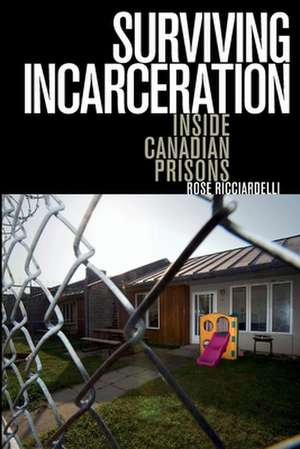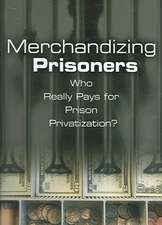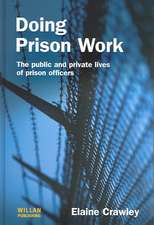Surviving Incarceration
Autor Rose Ricciardellien Limba Engleză Paperback – 30 apr 2014
Is prison a humane form of punishment and an effective means of rehabilitation? Are current prison policies, such as shifting resources away from rehabilitation toward housing more offenders, improving the safety and lives of incarcerated populations?
Considering that many Canadians have served time, are currently incarcerated, or may one day be incarcerated and will be released back into society it is essential for the functioning and betterment of communities that we understand the realities that shape the prison experience for adult male offenders. "Surviving Incarceration" reveals the unnecessary and omnipresent violence in prisons, the heterogeneity of the prisoner population, and the realities that different prisoners navigate in order to survive.
Ricciardelli draws on interviews with almost sixty former federal prisoners to show how their criminal convictions, masculinity, and sexuality determined their social status in prison and, in consequence, their potential for victimization. The book outlines the modern inmate code that governs prisoner behaviours, the formal controls put forth by the administration, the dynamics that shape sex-offender experiences of incarceration, and the personal growth experiences of many prisoners as they cope with incarceration. "
Preț: 274.91 lei
Nou
52.60€ • 55.04$ • 43.70£
Carte tipărită la comandă
Livrare economică 03-17 aprilie
Specificații
ISBN-10: 1771120533
Pagini: 250
Ilustrații: black & white illustrations
Dimensiuni: 223 x 157 x 15 mm
Greutate: 0.38 kg
Editura: Wilfrid Laurier University Press
Notă biografică
Cuprins
Table of Contents for
Surviving Incarceration: Inside Canadian Prisons by Rose Ricciardelli
Introduction
Narrative: Just a Kid: Forever Hurting
Introduction to Federal Corrections in Canada
The Focus: Setting the Stage
Changing Legislation in Corrections
What about Safety?
Chapter One
Narrative: A Life Without Freedom: The Multi-Prison, Multi-Sentence Experience
Correctional Services of Canada
Provincial versus Federal Corrections
Methods: The Men
Understanding the Classification System: Prisoner Classification
Does Prisoner Classification Work?
Understanding the Classification System: Institutional Classification
How I Found the Guys?
The Details
Chapter Two
Narrative: Addiction, Incest: Thirty-Two Years in Prison, Thirty-Six Years of Addiction
Hierarchy: Crime, Sexuality, Masculinity, and Safety
Factor 1. Being Solid: Criminal Convictions
Factor 2. Being Solid: Masculinities
The Oppressor
Presenting Tough
Acting Aggressive
Breadwinning
Factor 3. Being Solid: Prison Sex or Sexuality
The Largely Homophobic Environment
Consistently Subordinated Homosexuality?
Being Solid: Heterosexuality
Why Does the Hierarchy Exist?
Chapter Three
Narrative: A Violent Place Where Everybody Has a Story
Violence and Theory: The Prison Atmosphere
Theoretical Understandings
The Current Canada Prison Experience: Understanding and Acknowledging the Violence
The Atmosphere
Maximum-Security Prisons: Controls Within the Institution
High-Medium-Security Prison: Controls Within the Institution
Low-Medium- and Minimum-Security Prisons: Controls Within the Institution
Coercive Controls: Impacting Penal Violence
Remunerative Controls: Impacting Penal Violence
The Need: Balance
Chapter Four
Narrative: A Brother, a Son, a Lover, a Dad, a Man, a Prisoner with Heart
Hard Memories
Nowadays
The Inmate Code
The History of the Code
Why a Code?
What Is the Code?
Never Rat on a Con and Don't Get Friendly with the Staff
Be Dependable (Not Loyal)
Follow Daily Behaviour Rules or Else!
I Won't See You, Don't See Me, and Shut-up Already!
Be Fearless or at Least Act Tough
In the End
Chapter Five
Narrative: A Sex Offender's Story
The Other Crimes
Public Perceptions
Stigma Theory and Framing
The Sex Offender Stigma
Stigma in Prison: Stigmatized by Other Prisoners
The Stigma of Protective Custody
Painful Consequences: Stigmatized by Other Prisoners
Revelations, Intolerance, and Passing: The Quest to be Solid
Distancing Sex Offenders
Prisoners Exposing Prisoners
Professionals and Paraprofessionals in Corrections
The Role of the Media
Resources: Lacking Supports
The Systemic Sex Offender Stigma
Final Thoughts
Chapter Six
Narrative: Change from Within (It Changed Me)
The Personal Side: Coping, Changing, For Better or Worse
Coping with Incarceration: Trust in Self
Coping with Incarceration: When More is Needed
Change
Prison: Fostering Negativity
Change from Within and Holding on to Yourself
Resources and Programming
Chapter Seven
Narrative: Gang Affiliation, Clearly Not the Way of the Future
Final Words
What Can This Study Not Speak To?
What We Do Know?
Safe Streets and Prisons: Corrections at Work
Industry Growth: For Better or Worse
Notes
References
Index






















